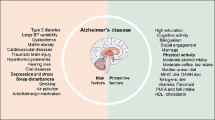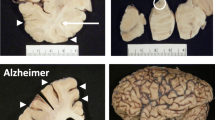Abstract
This study has identified a gene mutation in a Chinese family with Alzheimer’s disease (AD). Family members were screened by a set of medical examinations and neuropsychological tests. Their DNA was extracted from blood cells and sequenced for gene mutation in the amyloid precursor protein (APP), the presenilin 1 (PS1) and the presenilin 2 (PS2) genes. Genetic analysis showed that the AD patients in the family harbored a T to G missense mutation at the position 314 in exon 4 of the PS1 gene, resulting in a change of F105C in amino acid sequence. Clinical manifestation of these patients included memory loss, counting difficulty, personality change, disorientation, dyscalculia, agnosia, aphasia, and apraxia, which was similar to that of the familial AD (FAD) patients harboring other PS1 mutations. We intend to add a novel mutation F105C of the PS1 gene to the pool of FAD mutations. With the current available genetic data, mutations of the PS1 gene account for the majority of gene mutations in Chinese FAD.



Similar content being viewed by others
References
Cruts M, Theuns J, Van Broeckhoven C (2012) Locus-specific mutation databases for neurodegenerative brain diseases. Hum Mutat 33(9):1340–1344. doi:10.1002/humu.22117
De Strooper B, Saftig P, Craessaerts K, Vanderstichele H, Guhde G, Annaert W, Von Figura K, Van Leuven F (1998) Deficiency of presenilin-1 inhibits the normal cleavage of amyloid precursor protein. Nature 391(6665):387–390. doi:10.1038/34910
Dewji NN (2006) Presenilin structure in mechanisms leading to Alzheimer’s disease. J Alzheimers Dis 10(2):277–290
Finckh U, Muller-Thomsen T, Mann U, Eggers C, Marksteiner J, Meins W, Binetti G, Alberici A, Hock C, Nitsch RM, Gal A (2000) High prevalence of pathogenic mutations in patients with early-onset dementia detected by sequence analyses of four different genes. Am J Hum Genet 66(1):110–117. doi:10.1086/302702
Gomez-Tortosa E, Barquero S, Baron M, Gil-Neciga E, Castellanos F, Zurdo M, Manzano S, Munoz DG, Jimenez-Huete A, Rabano A, Sainz MJ, Guerrero R, Gobernado I, Perez-Perez J, Jimenez-Escrig A (2010) Clinical-genetic correlations in familial Alzheimer’s disease caused by presenilin 1 mutations. J Alzheimer’s Dis 19(3):873–884. doi:10.3233/JAD-2010-1292
Guo J, Wei J, Liao S, Wang L, Jiang H, Tang B (2010) A novel presenilin 1 mutation (Ser169del) in a Chinese family with early-onset Alzheimer’s disease. Neurosci Lett 468(1):34–37. doi:10.1016/j.neulet.2009.10.055
Jia J, Xu E, Shao Y, Jia J, Sun Y, Li D (2005) One novel presenilin-1 gene mutation in a Chinese pedigree of familial Alzheimer’s disease. J Alzheimer’s Dis 7(2):119–124 discussion 173–180
Lan MY, Liu JS, Wu YS, Peng CH, Chang YY (2013) A novel APP mutation (D678H) in a Taiwanese patient exhibiting dementia and cerebral microvasculopathy. J Clin Neurosci. doi:10.1016/j.jocn.2013.03.038
Larner AJ (2013) Presenilin-1 mutations in Alzheimer’s disease: an update on genotype-phenotype relationships. J Alzheimer’s Dis 37(4):653–659. doi:10.3233/JAD-130746
Li J, Wang YJ, Zhang M, Xu ZQ, Gao CY, Fang CQ, Yan JC, Zhou HD, Chongqing Ageing Study G (2011) Vascular risk factors promote conversion from mild cognitive impairment to Alzheimer disease. Neurology 76(17):1485–1491. doi:10.1212/WNL.0b013e318217e7a4
Nan S, Han Y, Fan J, Chen Q (2011) Identification of a rare amyioid precursor protein gene mutation in a Chinese family with early-onset familial alzheimer’s disease. Chin J Neuromed 44(1):47–51. doi:10.3760/cma.j.issn.1006-7876.2011.01.013
Petersen RC, Smith GE, Waring SC, Ivnik RJ, Tangalos EG, Kokmen E (1999) Mild cognitive impairment: clinical characterization and outcome. Arch Neurol 56(3):303–308
Sherrington R, Rogaev EI, Liang Y, Rogaeva EA, Levesque G, Ikeda M, Chi H, Lin C, Li G, Holman K, Tsuda T, Mar L, Foncin JF, Bruni AC, Montesi MP, Sorbi S, Rainero I, Pinessi L, Nee L, Chumakov I, Pollen D, Brookes A, Sanseau P, Polinsky RJ, Wasco W, Da Silva HA, Haines JL, Perkicak-Vance MA, Tanzi RE, Roses AD, Fraser PE, Rommens JM, St George-Hyslop PH (1995) Cloning of a gene bearing missense mutations in early-onset familial Alzheimer’s disease. Nature 375(6534):754–760. doi:10.1038/375754a0
Xu E, Jia J, Sun W (2002) Mutation site of presenilin-1 gene in familial Alzheimer’s disease. Zhonghua yi xue za zhi 82(22):1518–1520
Zeng F, Zou HQ, Zhou HD, Li J, Wang L, Cao HY, Yi X, Wang X, Liang CR, Wang YR, Zhang AQ, Tan XL, Peng KR, Zhang LL, Gao CY, Xu ZQ, Wen AQ, Lian Y, Zhou XF, Wang YJ (2013) The relationship between single nucleotide polymorphisms of the NTRK2 gene and sporadic Alzheimer’s disease in the Chinese Han population. Neurosci Lett 550:55–59. doi:10.1016/j.neulet.2013.06.061
Acknowledgments
This work was supported by the National Natural Science Foundation of China (Grant No. 81270423 and 30973144), the Natural Science Foundation Project of CQCSTC (Grant No. CSTC2010BA5004), China Postdoctoral Science Foundation (Grant No. 2012M521861), and the Chongqing Postdoctoral Science Foundation (Grant No. Xm201342).
Ethical standards
The study was approved by the Institutional Review Board of Daping Hospital. Written consents for genetic screening were obtained from all participants or their legal representatives.
Conflict of interest
There are no conflicts of interest.
Author information
Authors and Affiliations
Corresponding authors
Additional information
Bo Deng and Yan Lian have contributed equally to this work.
Rights and permissions
About this article
Cite this article
Deng, B., Lian, Y., Wang, X. et al. Identification of a Novel Mutation in the Presenilin 1 Gene in a Chinese Alzheimer’s Disease Family. Neurotox Res 26, 211–215 (2014). https://doi.org/10.1007/s12640-014-9462-3
Received:
Revised:
Accepted:
Published:
Issue Date:
DOI: https://doi.org/10.1007/s12640-014-9462-3




